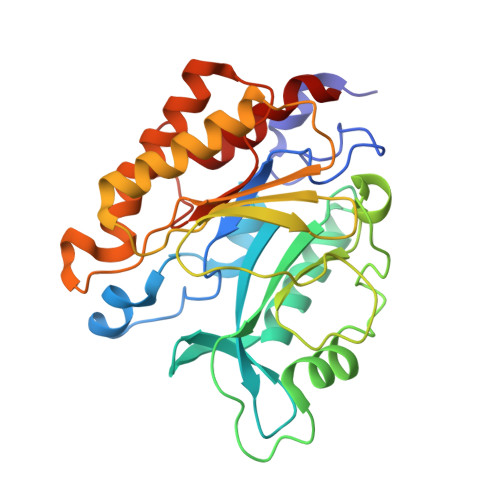Modulation of bacillus thuringiensis phosphatidylinositol-specific phospholipase C activity by mutations in the putative dimerization interface.
Shi, X., Shao, C., Zhang, X., Zambonelli, C., Redfield, A.G., Head, J.F., Seaton, B.A., Roberts, M.F.(2009) J Biol Chem 284: 15607-15618
- PubMed: 19369255
- DOI: https://doi.org/10.1074/jbc.M901601200
- Primary Citation of Related Structures:
3EA1, 3EA2, 3EA3 - PubMed Abstract:
Cleavage of phosphatidylinositol (PI) to inositol 1,2-(cyclic)-phosphate (cIP) and cIP hydrolysis to inositol 1-phosphate by Bacillus thuringiensis phosphatidylinositol-specific phospholipase C are activated by the enzyme binding to phosphatidylcholine (PC) surfaces. Part of this reflects improved binding of the protein to interfaces. However, crystallographic analysis of an interfacially impaired phosphatidylinositol-specific phospholipase (W47A/W242A) suggested protein dimerization might occur on the membrane. In the W47A/W242A dimer, four tyrosine residues from one monomer interact with the same tyrosine cluster of the other, forming a tight dimer interface close to the membrane binding regions. We have constructed mutant proteins in which two or more of these tyrosine residues have been replaced with serine. Phospholipid binding and enzymatic activity of these mutants have been examined to assess the importance of these residues to enzyme function. Replacing two tyrosines had small effects on enzyme activity. However, removal of three or four tyrosine residues weakened PC binding and reduced PI cleavage by the enzyme as well as PC activation of cIP hydrolysis. Crystal structures of Y247S/Y251S in the absence and presence of myo-inositol as well as Y246S/Y247S/Y248S/Y251S indicate that both mutant proteins crystallized as monomers, were very similar to one another, and had no change in the active site region. Kinetic assays, lipid binding, and structural results indicate that either (i) a specific PC binding site, critical for vesicle activities and cIP activation, has been impaired, or (ii) the reduced dimerization potential for Y246S/Y247S/Y248S and Y246S/Y247S/Y248S/Y251S is responsible for their reduced catalytic activity in all assay systems.
Organizational Affiliation:
Department of Chemistry, Boston College, Chestnut Hill, Massachusetts 02467, USA.















